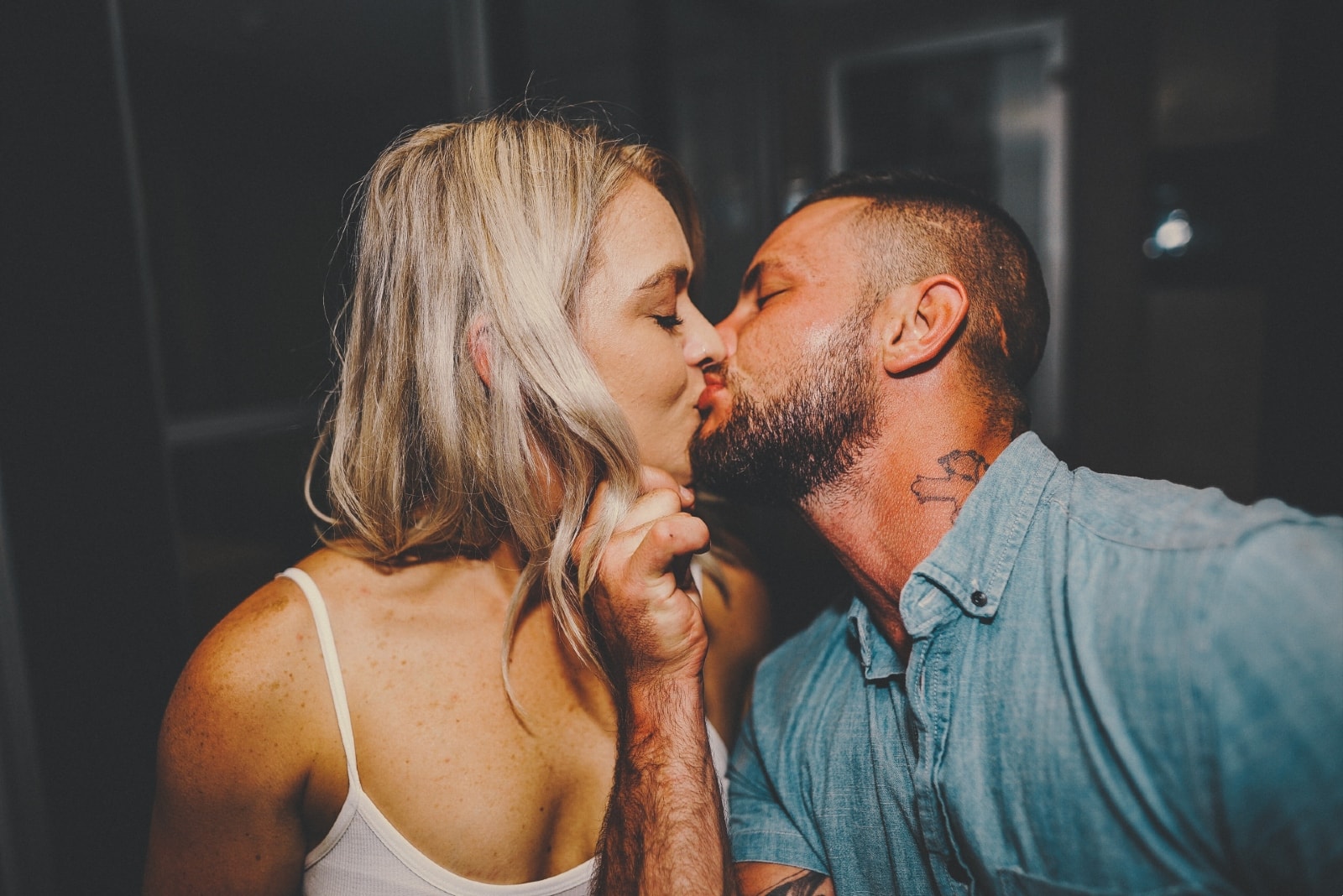You’ve spent a significant amount of time in your life figuring out dating and romance. Truth be told, this has been one of your primary concerns ever since your teenage years. Well, you’re not alone.
But is it possible that you never got to the bottom of your love life because you had no idea how many types of relationships there are? Yes, there is much more out there than the patterns that you’re used to.
So, what are the types of relationships? How do you recognize each one of them? And most importantly: how do you handle them the best way possible?
We’ve got you covered. Here are the answers to all of these questions and more.
Co-dependent
What is it?
Many people see this kind of interpersonal relationship as normal and typical; the truth is that it’s anything but healthy.
Basically, when you’re in a codependent relationship, you don’t love your partner the right way – you just think you do.
In fact, you’re addicted to them. It’s normal for your partner to play an important role in your life, but it’s much worse than this in your case.
You’re obsessed with their presence in your life, and everything they do or say affects you.
In time, you lose yourself completely. Your primary goal in life is to keep this person by your side because you’re convinced that you would literally die without them.
What makes it unhealthy?
No, this is not romantic, and it’s certainly not the way a healthy romance should look. I hate to break it to you, but you’re a clingy girlfriend or boyfriend if you’re codependent.
You have no self-sufficiency, no autonomy, and no life outside of your relationship. Truth to be told, you’re unable to express any type of emotion that doesn’t concern your partner.
You don’t care what happens in the world outside of your intimate relationship, as it’s the only thing that really matters to you.
You suffer from a lack of self-esteem, and you live in a constant fear of your partner walking away from you.
With time, you develop serious abandonment trauma. Your entire world revolves around this person – they give you meaning and make you fulfilled.
Without them, you’d be utterly lost, and your existence would be pointless. At least, this is how you feel.
The worst part is that your boyfriend or girlfriend enables your obsession. They enjoy the fact that you depend on them, even though they would probably never admit it.
Otherwise, they wouldn’t have stayed with you so long, would they? The truth is that the other party enjoys the emotional control they’ve managed to impose on you.
This is the only way for them to feel relevant. Your behavior serves them as an ego boost, and that’s the only reason they keep you around.
Independent
What is it?
The opposite of a codependent relationship is an independent one. At first, you might see independent couples as anything but real partners as they rarely follow traditional relationship patterns.
You imagine them living completely separate lives, and for some people, they might even appear as strangers. However, this is far from the truth.
You see, when you’re in an independent relationship, you remain the person you were before meeting your loved one.
However, this doesn’t mean that you’re not subject to personal growth and improvement.
It’s just that neither of you changes the essence of their beings just to please the other person. Even though you’re in a relationship, you keep the life you had before your partner.
Yes, you two meet halfway on some things – that is completely normal. However, you still have your goals, career, friends, family relationships, and hobbies.
Now you’ve just found someone to accompany you on this journey called life. You’ve found someone who won’t try to mold you and who won’t do anything to endanger your individuality.
What makes it a healthy relationship?
The best part about this relationship is that you don’t actually need your partner – you’ve just chosen to be with them.
Of course, you would miss them if they were gone. You would grieve their absence, but your world wouldn’t stop spinning if that happened.
You don’t depend on them financially, emotionally, or in any other way. Their departure wouldn’t mess up your life too much, and it certainly wouldn’t significantly reduce its quality.
This might sound harsh, but in this situation, you both put yourselves first. It doesn’t mean that you don’t love your boyfriend or girlfriend – you just love yourself more.
Trust me: this doesn’t make you selfish. It only shows that you’re both mature and have the capacity to look at things realistically, without feelings included.
Whether you like to admit it or not, your love could fade away one day. You two might part ways.
And if that happens, what remains? Well, you’ll be left alone with yourself.
You’ll be left with the life you’ve built outside of your romance, so it better be a good one.
Active/passive
How does it work?
The title says it all: in this relationship, there is a clear difference between an active and a passive partner. I’m sure you’ve seen tons of relationships, especially marriages like this.
I’m talking about the ones where, for example, a wife/mother is in charge of basically everything. She does the cooking, the cleaning, and other chores.
She is the one responsible for the children’s upbringing, and the one everyone consults with before making a life-changing decision.
On the other hand, the husband just goes with the flow. Most of the time, he is a passive bystander to his own family members.
He has no interest in how the kids are raised, where they will go on their next vacation, or what they’ll have for lunch. This man’s only responsibility is to go to work and bring money home.
For the rest of the day, he lies on the couch, watches TV, and acts like a real parasite. Of course, things can go both ways, and this is just an example.
Why is it unsustainable?
However, an active/passive relationship doesn’t always have to be this obvious – sometimes you don’t even realize that your relationship struggles with this kind of dynamic.
In most cases, the active partner is the one who carries the entire relationship on their back, one way or another.
At the end of the day, they’re the ones keeping it alive, while the other person just tags along.
The reason why these types of relationships are more common than you might think is that opposites attract.
When they first meet, the passive partner calms the active one down. On the other hand, the active party brings the excitement the passive one misses.
However, as soon as the initial butterflies are gone, you face trouble in paradise. The active partner starts to feel overwhelmed while the passive one can’t handle the pressure.
Dominant/submissive
What is it?
Many people make a mistake when thinking that active/passive and dominant/submissive types of relationships are the same thing. However, the fact is that they differ in many ways.
Just because you’re an active partner doesn’t make your boyfriend or girlfriend submissive.
You might be louder, more capable, or even more aggressive when it comes to your common interests, but that doesn’t mean that the other person is automatically compliant.
When you hear these terms, the first thing you probably think of is the bedroom.
Well, the dominant/submissive relationship is much more than that, and your activities between the sheets are mostly just one part of it.
A submissive partner has no say in and out of the bedroom, and all control is in the hands of the dominant one. They’re the one who governs both of your lives in all of its aspects.
At first glance, the dominant partner has it better in this kind of power dynamic. The truth is that they have many more rights.
Nevertheless, their responsibilities are bigger, as well. It’s their duty to protect their submissive wife or husband, to take care of them in all possible ways, and to lead them through life.
They’re in charge of the entire decision-making process in the relationship and, therefore, take all the blame if something goes wrong.
Can it succeed?
For most people, a dominant/submissive power dynamic is the worst thing ever. However, some enjoy their superiority, and some love being obedient.
So, if it works for them – who are we to judge?
Just bear in mind that there is a huge difference between a romance in which both parties agreed to this setup and a relationship where this power struggle is forced.
If you’re a submissive partner, you’re not your loved one’s slave, nor are they your master.
The most important thing is that you can and should put a stop to this game the moment it starts making you uncomfortable.
Platonic
What is it?
I’m sure you heard about this kind of relationship. It was named after the famous philosopher Plato. With time, the concept has been modified, although the source idea has remained the same.
In a platonic relationship, you and your partner share deep emotions for each other.
You’re committed to making your romance work; you share the same values, common interests, and you plan a future together.
However, there is nothing physical going on between you two. It’s not that you just don’t sleep together – there is also no touching and kissing. Basically, there is no physical attraction and chemistry.
This might sound strange or even impossible for modern dating but trust me – a lot of people choose this relationship as something that suits them best.
For these couples, intimacy is much more than satisfying your primal urges. They focus on other things, such as forming a deeper and stronger bond and becoming the best possible versions of themselves.
What can go wrong?
Sounds too good to be true, right? Well, the fact is that not many people can make this kind of relationship work out.
Whether we like to admit it or not, we all have needs that we can’t control.
This is why these relationships fail in most cases: one of the partners finds the passion they’re lacking back home and realizes that this is not how they can continue living.
Friendzone
However, please don’t mistake friend-zoning for a platonic relationship. Theoretically, they’re similar, but not the same.
In both cases, you have two people who are friends and, in a way, share a life together, but there is nothing physical going on between them.
Nevertheless, when you’re in a platonic relationship, you both agree to these terms. On the other hand, a friendzone means that one person has not-so-platonic feelings for the other.
They would never choose to be platonic if they had the chance – they are just left with no other choice.
At the same time, in most cases, the other person has no idea about their feelings and sees them as nothing more than a friend.
Temporary
How does it work?
When you start a new relationship, you don’t know where it will take you or how long it will last. But every time, you hope that this is the real deal.
You don’t think about the end, nor do you plan a break-up now that everything is going smoothly. At least, this is how things usually work. Well, with a temporary relationship, everything is different.
From the very first day, this romantic relationship has an expiration date. You know it’s not permanent, and you don’t give your entire self to it.
You don’t plan your future with this person, you don’t introduce them to your friends and family, and you don’t share your deepest thoughts and feelings with them.
Officially, they’re your boyfriend/girlfriend, but they’re not your life partner.
You might be moving out of town in a couple of months but don’t want a long-distance relationship. Or you’re not ready to share your life with someone else but don’t want to be alone either.
When is it unhealthy?
There is nothing wrong with temporary romances under one condition: that you both agree to the terms of your relationship. The worst thing you can do is give your partner false hope.
Sadly, in most cases, these types of relationships are only seen as temporary for one person. For them, this romance has an expiration date while the other is completely clueless.
Or the other party simply refuses to accept the way things are. There they are, making plans and hoping that everything will change in the future.
They see themself going down the aisle to the person who sees them as a temporary fix instead of a permanent solution. In this case, this romance is unhealthy, toxic, and, most importantly: unfair.
Avoidance
What is it?
Unfortunately, today more and more people get themselves involved in an avoidance relationship without even knowing it. Simply put, this is a romance between two people who avoid any kind of intimacy.
But I’m not referring to physical intimacy this time. I’m talking about real emotional connection.
Often, these people have been hurt in the past.
Consequently, they’ve built strong walls around their hearts. They’ve become overly careful, and their worst fear is of being hurt again.
So, they act as if they’re heartless since they’re convinced it’s the only way to protect themselves from going through the same hell once more.
These people are emotionally unavailable, and they consciously choose partners they can have an avoidance type of relationship with.
The avoidant person doesn’t include their boyfriend/girlfriend in their life, they refuse to open up completely, and they never give them their whole heart.
Instead, they’re constantly on the lookout. They avoid any situation that might reveal their vulnerabilities and force them to lay down their shield.
They have deeply rooted trust issues and are ready to run the moment they see that the other person has gotten too close.
Emotional neglect
The problem with these relationships is that the other partner almost always ends up feeling emotionally neglected. At first, you think that you’ll tear down your loved one’s walls with time.
However, despite all of your attempts, that doesn’t happen. You end up feeling unloved and unwanted, which severely damages your self-esteem and mental health.
Scripted
What does it look like?
You know those couples who have been together for ages?
They did everything by the book: they graduated together, got engaged, got married, and now they have kids, a dog, and live in a big, white-picket-fenced house in the suburbs.
At first glance, this kind of life looks like a fairytale. After all, this is what we’ve all dreamt of while growing up.
But sometimes, things are too good to be true. Don’t get me wrong – I’m not claiming that every seemingly perfect relationship is not as great as it seems.
However, scripted relationships are just like that. In fact, in most cases, they remind you of those Stepford families.
They are together and do everything by the book because that is how things should be. These couples aren’t living the life they want because they’re too busy fulfilling expectations.
I don’t know whether they’ve been told that their life has to look like this, if they come from a traditional family who taught them that this was the only way, or if they’re just too obsessed with meeting society’s standards.
Where can it go wrong?
To bystanders, these couples have it all: they have steady jobs, pay their mortgage, and go on vacations.
Their wedding day was magical, their kids are well-raised, they visit their families, spend Sundays together, and hang out with other families similar to theirs.
But do they have true love? Is there a genuine emotional connection here? Do they really listen to each other?
Nobody has ever heard them arguing – but you won’t see them kissing either. One question arises here: Are people in scripted relationships robots or human beings?
Validation
Why does it happen?
People who deal with various insecurities have an uncontrollable urge for validation in different forms of relationships.
They need someone who will tell them that they’re enough, that they’re doing okay, and that they’re valuable. Otherwise, they won’t see their own worth.
This usually starts in early childhood where a kid asks for validation from their parents, friends, or teachers.
However, if they don’t get the right kind and amount of proof that they matter, they’ll continue seeking it through adulthood.
When you’re in this type of relationship, all you need is your partner’s acceptance. Your self-esteem completely depends on their opinion, so you’re also, in a way, co-dependent.
Whatever you do, you do it for them to think that you’re enough. You have the need to prove your worth to them because you don’t have it without their validation.
You constantly wonder if you could do better, if they’re happy with you, and if you’re giving them all you should. The moment you see their dissatisfaction, you’re convinced that you did something wrong.
You overthink your every word and move. You blame yourself for everything wrong in your relationship as if they have no responsibility for your relationship whatsoever.
What makes it wrong?
Let’s get one thing straight: someone else can never give you confirmation of your worth until you start feeling valuable. It shouldn’t depend on your relationship but your own opinion and fee first person that crosses your path, and you staelings.
I’m trying to say that your starting point for change has to be learning how to build your self-confidence.
All the love you’re getting from your partner is completely pointless unless you learn how to love yourself.
Rebound
What is it?
So, you’ve been in a long term relationship which ended badly. In fact, it’s irrelevant how long it lasted. Truth to be told, maybe it wasn’t an actual relationship in the first place.
Either way, the bottom line is the same: you got your heart broken. I don’t care if it was infidelity, if the other person didn’t want you, abused you, or just didn’t love you enough.
You’re disappointed and see no light at the end of the tunnel. You’ve stopped believing in love and hoping that one day, you’ll find happiness.
You think that all women or men are the same and that everyone will hurt you the same way your ex did.
You don’t see yourself giving your heart to another person ever again, and you gave up on your “happily ever after.”
So what do you do? Do you process your emotions? Do you wait for things to get better?
Do you heal in a healthy way? Do you accept that you’re emotionally unavailable and abstain from any romantic relationships?
No – you do the complete opposite. You go around, fixing your problems by creating new ones, which, of course, never turns out well.
You grab the first person that crosses your path, and you start dating them. Not only that – you also start things seriously.
However, you’re doing it all to forget about your ex. You’re using this person who has nothing to do with your scars, and you’re hurting them the same way you’ve been hurt.
And this, my friend, is a typical example of how rebound relationships roll. The sad thing is that they’re all around us.
What makes it unhealthy?
The problem is that the other person has no clue that they’re your rebound. They have no idea that you’re taking advantage of them and that they’re serving as a bandage for your crushed heart.
That is precisely what makes this entire arrangement wrong and evil – you’re hurting someone harmless in the process. You lead them on, and you give them false hope.
Yes, you’re with your BF/GF physically, but mentally and emotionally, you’re somewhere far away. And that is something no person in this world deserves. Basically, you’re no better than your ex.
Almost
How does it happen?
When you start dating someone new, the last thing you want is to appear desperate.
You don’t want your new boyfriend/girlfriend to think that you’ve hit the jackpot by meeting them or to see you as some loser whose only goal is to find someone to love them.
After all, being emotional is out of style, isn’t it? We’re all acting casual, and the one who shows feelings first is a loser.
So, you don’t put your cards on the table. There you are spending time and sleeping together, but you never ask where you stand.
You’ve never committed to not seeing other people, even though this is what you’d secretly like to happen. You hope that your relationship will start looking like something else one of these days.
The number one problem is that everything looks like you’re in a real relationship, but you’ve actually never defined it.
It all looks perfect until there comes a time for you to be bothered by something. Maybe they almost flirt with other people or still have dating apps installed.
But you can’t say anything, can you? After all, you haven’t made things clear, and they never promised their fidelity.
Sounds familiar, right? Well, this is what’s called an almost relationship – a trap almost all of us have fallen into at least once.
Why is it damaging?
Don’t get me wrong – I’m not against these types of relationships. But remember that it’s all fun and games until one of you catches feelings.
And I assure you that this will happen sooner or later. I know what you must think: you’re above that, and you can control yourself.
Well, in most cases – you can’t. So, it’s better not to start these relationships in the first place to avoid any regrets later.
Balanced
What is it?
A balanced relationship is basically the one in which you receive just as much as you take. You put in the amount of effort you’re getting from your partner.
But you know what a famous quote says? “A relationship isn’t always 50/50. Some days a person will struggle. You suck it up and pick up that 80/20 cause they need you. That’s love.”
What I’m trying to say is that you shouldn’t measure the devotion, time, and effort both of you put into a relationship.
But at the end of the day, when you calculate everything, you’re pretty much on the same level.
Neither partner feels like they’re making all the sacrifices. They don’t feel like they’re moving mountains for someone who isn’t ready to move a finger for their sake.
Everything in this romance is balanced, including your feelings.
You’re not the one who loves more, nor does your partner feel like their love is unrequited. You two are equals, and that‘s the magic of it all.
Why is it a healthy relationship?
I’ll be straight with you: out of all types of relationships, this is one of the best. Not only that: it also has the most chance of succeeding.
You and your partner have healthy communication. You both give your entire selves, and you join forces to make things work.
Nobody feels emotionally neglected or used. Nobody feels unloved and unwanted.
You’re 100% into the other person. There are no hidden insecurities or traumas.
Convenient
What is it?
This one is quite similar to the rebound relationship we’ve already discussed. It is also temporary, and one person doesn’t share the same feelings.
However, when you’re dating someone conveniently, you’re not doing it primarily to get over a person from your past. You’re not necessarily heartbroken or hurt.
In fact, you don’t even have to be extra careful. In this case, you’re not scared of going through the same hell you went through in your past.
Here, you’re with your boyfriend or girlfriend just because you don’t want to be alone. On the other hand, there is no one better around.
Despite all of your attempts, you can’t seem to find your perfect match. You know exactly what you’re looking for, but sadly, you haven’t crossed paths with your dream guy or girl yet.
So, you start dating the first person that comes along. There is no extreme chemistry here, and you certainly don’t plan on spending the rest of your life with them.
But they’re convenient for the moment. They don’t bother you much, they meet some of your basic standards, you like them to a certain extent, and they keep you company.
It’s better than being alone, isn’t it? Especially if all of your friends are taken, and you could use a plus one.
Why is it bad?
Well, isn’t it obvious how wrong this is on so many levels?
Let’s start with the fact that you’re dragging someone innocent along. You’ll end up breaking their heart with your little games once you leave them for the person who has everything you want.
But not only that: this is also damaging for you. You’re living a lie, and you’re wasting your time on the wrong person while you could be out there searching for your Mr. or Ms. Right.
Toxic
What is it?
You know those relationships where it’s all about the fireworks? You feel like you can’t live without this person, but it’s pretty obvious that you two don’t function well together either.
So, you keep going back and forth. You’ve split up more times than anyone can count, but you always find a way back to each other.
Of course, you drag other people into your mess along the way. You start dating someone new, but somehow, you end up with your ex every time.
It’s enough for your loved one to look at you to tear down all of your walls. No matter what happens, your love trumps everything.
At least, that is what you think, isn’t it? This must be love – after all, it’s clear that the two of you are meant to be together.
Well, this couldn’t be further from the truth. This is a toxic relationship you’ll waste years of your life on.
Why is it so appealing?
It’s in human nature to chase what they can’t have. That is exactly what you two do: you run after each other because you’re both so unattainable.
Even though deep down, you’re sure of your partner’s emotions, you never know their next move. They’re unpredictable, and all of this drama makes you feel more alive.
As much as you hate to hear this, this is anything but healthy. Instead, it’s poisonous, and it will leave severe consequences for your mental health.
Long-distance
What is it?
Once again, the name says it all: this is the type of relationship where you’re physically apart from your loved one. But the distance doesn’t impact your love, or at least – it shouldn’t.
Of course, it all depends on how far away you live from each other. Most long-distance couples don’t meet as often as they’d like, and most of the time, they rely on technology.
Does it last?
The ultimate question is if long-distance relationships work out in the end or not. Well, just like with everything else in life: there is no rule, and it all depends.
First and foremost, you need to have a plan. You can’t continue living like this forever, especially if you want to start a family.
Therefore, it’s crucial that you’re both on the same page here.
Who will move where? Will you meet halfway, or will one of you leave their life behind and join the other person?
What will happen to your careers, friends, hobbies, and families? Are you really ready to make this huge step?These are all the questions that you need to answer before making any crucial changes.
On the other hand, if you don’t have any concrete plans and don’t talk about the future, what’s the point of your long-distance relationship? Do you plan on having FaceTime dates for the rest of eternity?
Another thing you must forget about is excessive jealousy. Whether you like it or not, your partner lives across the country from you, so you have no other choice but to trust them.
Dating
What is it?
When you’re dating, you’re out there on the market. You’re looking for your soulmate, and you’re meeting new people during your quest.
You might find your potential dates on a dating app, on social media, or you’re going on blind or speed dates.
But this is not the only definition of dating. There is also an option when you’re dating only one person at a time, but you still don’t call it a relationship.
Where can it lead?
Either way, dating is completely harmless under the condition that everyone involved knows what they’re getting themselves into.
You have to be clear that you’re not seeing anyone specific and that you’re not ready to be exclusive just yet.
Also, there is nothing wrong if you don’t feel like dating. You’re allowed to flirt and text with someone, but that doesn’t mean you’re obligated to go on a date with them.
The good thing about being on the dating market is that you get a chance to meet a bunch of new people. You won’t like some of them, but you can always remain friends.
On the other hand, it significantly increases your chances of meeting the one. Don’t be fooled into thinking that real love has to happen – sometimes you need to put effort into finding it.
It’s not always like in the movies, and you won’t necessarily fall in love with your forever person at first sight.
Sometimes, you’ll go out on a few dates, and then you’ll realize that they stand out from everyone else you might be seeing.
Spontaneously, you’ll become exclusive, start a more intimate relationship, and understand that you’re meant for each other. You know, the old fashioned way.
Friends with benefits
How does it happen?
Simply put, friends with benefits is a type of intimate relationship when you’re hooking up with someone who is your friend. It’s more than a casual affair in which everything revolves around physical pleasure.
You and this person have a deep connection. They get you, take care of your well-being, listen to you, and they show up when you need their help or a shoulder to cry on.
On top of it all, you have amazing chemistry, and you get along great between the sheets. So, the logical question arises: how is this different from a real relationship, and why are you not exclusive?
Well, first of all, these kinds of relationships are hardly ever public. You hide your little adventures, which makes it even cuter and exciting.
Also, you two don’t go out on actual dates. There is no jealousy involved, and you’re allowed to meet and date other people. How perfect is that?
Why can it go wrong?
It seems that almost nothing could possibly go wrong here. You get to kiss your best friend whom you’re physically attracted to, but you don’t get the bad sides every romantic relationship brings to the table.
But what happens when you do meet someone new? I know what you’ll say: “we’ll end our little fling.”
But will you indeed? Will you keep on hanging out as if nothing has happened, or will one of you end up heartbroken?
Will you be honest with your partner about the romantic history you had with your friend? If the answer is yes, how do you think they’ll take it?
Will they be okay with you two staying close friends? Or will they ask you to distance yourself from your friend with benefits? If so, who will you choose?
Dilemmas, dilemmas, dilemmas. The truth is that it’s quite likely that you’ll find yourself in this situation. And according to relational experts, it will happen sooner than you might think.
Therefore, if you don’t have the answers to all of these questions, I’ll give you a piece of relationship advice: maybe it’s better to stay away from this arrangement.
Another reason not to do it is your emotional instability. It’s more likely that you’ll fall in love with your friend (who you already love in a non-romantical way) than with some stranger you’ve just met.
What happens if one person’s feelings grow, but the other’s don’t? The end of your friendship, that’s right.
Do you want to ruin it forever for a few moments of passion? Of course, you don’t. That’s what I thought.
Open
What is it?
An open relationship doesn’t equal infidelity. When you’re unfaithful in a monogamous relationship, you go behind your partner’s back.
You deceive them into thinking that they’re the only one in your life while you’re actually backstabbing them with your lover.
In an open relationship, all cards are on the table, without anything hidden. You’re both allowed to see other people, to go on dates, or even to sleep with them.
However, no matter what happens, you always go back to each other. As strange as this might sound to some, some couples really enjoy this type of romance.
They don’t love each other any less than “regular” couples, and they only see this as a little hobby that keeps the spark alive.
Why is it so bad?
What happens when someone crosses the line? In an open relationship, there is always a set of rules: a list of things that are acceptable and unacceptable.
But can you really control yourself? Who
can guarantee that you won’t fall in love with one of your dates?
Don’t get me wrong: this level of trust is admirable, and not many could stand it. However, things go unplanned in a split second.
Final Thoughts
At the end of the day, please remember that every romance is a unique love story. These types of relationships should serve as a starting point to identify your relationship and, hopefully, improve it.
Forget about what other people will say and choose the right option that suits you the best.
The only thing that matters is you and your partner’s satisfaction and joy, and nobody else, besides you two have a say in these things.
Also, if you’re intrigued and want to learn more about interesting types of relationships, check out our new content on the polyamorous one.
So, what type do you like the most?




















